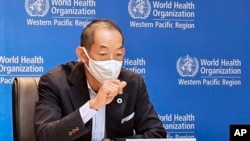The World Health Organization’s (WHO) director for the Western Pacific said Friday the region must prepare for the new omicron variant of the coronavirus because it appears to be spreading rapidly around the world.
At a virtual news conference in Manilla, WHO Regional Director Takeshi Kasai told reporters, while most countries in the region are seeing things headed in the right direction, with the number of COVID-19 cases and deaths decreasing or at least plateauing, the omicron variant is a reminder that nations should not be complacent.
There is evidence the omicron variant is moving quickly, with cases reported early Friday in Australia, Japan, South Korea, Singapore, Malaysia and India.
First reported and dubbed a "variant of concern" by the WHO last month, scientists are still gathering data to establish how contagious and severe omicron can be.
Kasai suggested closed borders can be an effective way for nations to delay the virus from taking hold in a country and can buy time for leaders to take extra precautions. But he said every country and every community must prepare for new surges in the number of cases.
The WHO regional director said the good news is none of the information currently available for the omicron variant suggests a need to change the direction of the response.
Kasai said, “Our experience of the last two years, especially in dealing with variants like delta, provides a guide about what to do now, as well as how to cope with future surges in a more sustainable way.”
He said stepping up vaccinations, taking public health precautions like masks and social distancing, and appropriate isolation and care for those with COVID-19 are the best ways to protect communities.
The WHO Western Pacific Region includes 37 countries and areas from Palau to Mongolia.
Some information for this report was provided by The Associated Press, Reuters, and Agence France-Presse.






